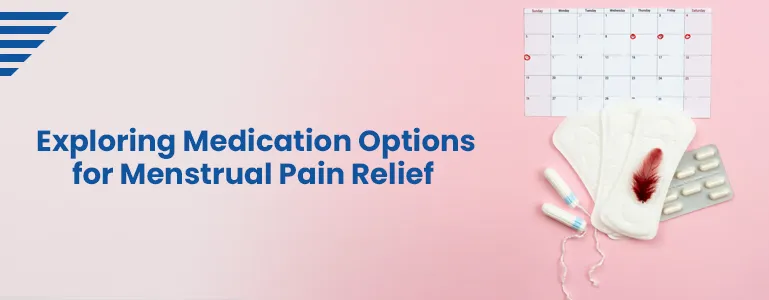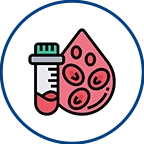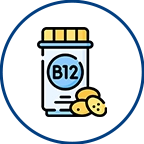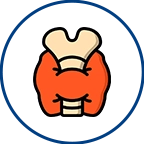Exploring Medication Options for Menstrual Pain Relief

Every month, many individuals experience a natural physiological process known as menstruation. While this process is essential for reproductive health, it often brings along a range of discomforts, with menstrual pain being one of the most common complaints. Medically referred to as dysmenorrhea, menstrual pain can vary from mild discomfort to severe cramps that interfere with daily activities. Thankfully, there are various medication options available to alleviate this discomfort and provide much-needed relief.
Home Sample Collection
Nonsteroidal Anti-Inflammatory Drugs (NSAIDs): NSAIDs, such as ibuprofen and naproxen, are among the most widely used over-the-counter medications for menstrual pain relief. These drugs work by reducing the production of prostaglandins, hormone-like substances that trigger uterine contractions and inflammation, leading to pain. NSAIDs not only alleviate cramps but also help reduce the intensity of headaches, lower back pain, and general discomfort associated with menstruation.
Acetaminophen: Acetaminophen is another over-the-counter option for menstrual pain relief. Unlike NSAIDs, acetaminophen does not possess strong anti-inflammatory properties. However, it can still effectively reduce pain and discomfort. It's important to note that acetaminophen should be used cautiously and as directed, as excessive use can lead to liver damage.
Birth Control Pills: For those seeking a long-term solution to menstrual pain, birth control pills are an option to consider. Hormonal birth control techniques, such hormonal patches and combination oral contraceptives, control periods by balancing the menstrual cycle and easing cramping. They do so by preventing ovulation and reducing the buildup of the uterine lining, thereby decreasing the production of prostaglandins.
Prescription-Strength NSAIDs: In cases of severe menstrual pain that doesn't respond well to over-the-counter NSAIDs, A doctor might suggest taking NSAIDs at a greater dosage. These prescription-strength medications can provide more effective relief for individuals with intense cramps.
Muscle Relaxants: Muscle relaxants, such as baclofen or cyclobenzaprine, may be prescribed to alleviate the muscle tension and spasms that often accompany menstrual pain. These medications work by relaxing the muscles of the uterus and surrounding areas, helping to reduce cramping sensations.
Herbal Remedies: Some individuals prefer to explore natural remedies for menstrual pain relief. Herbal options like ginger, cinnamon, and chamomile have been traditionally used for their anti-inflammatory and muscle-relaxing properties. While there's limited scientific evidence supporting their effectiveness, some people find relief from these remedies.
Lifestyle Modifications: In addition to medication, certain lifestyle changes can contribute to reducing menstrual pain. Regular exercise, a balanced diet, stress management techniques, and adequate hydration can all play a role in minimizing discomfort during menstruation.
Conclusion:
Menstrual pain is a common occurrence for many individuals, but it doesn't have to disrupt daily life. With a range of medication options available, from over-the-counter NSAIDs to hormonal birth control methods, there's likely a solution that can provide the relief you need. However, Before beginning any new medicine, it's crucial to speak with a healthcare provider, especially if you have underlying medical conditions or are already on medications. They can help you determine the best approach to managing your menstrual pain based on your individual needs and health history. Remember, you don't have to suffer in silence – relief is within reach.
Frequently Asked Questions
1. What is menstrual pain, and why does it occur?
Menstrual pain, also known as dysmenorrhea, refers to the discomfort and cramping experienced by individuals during their menstrual cycle. This pain is primarily caused by the release of prostaglandins, hormone-like substances that trigger uterine contractions to shed the uterine lining. These contractions can cause pain ranging from mild to severe.
2. What are NSAIDs, and how do they help with menstrual pain?
Nonsteroidal anti-inflammatory drugs, or NSAIDs, are a class of drugs that work by preventing the synthesis of prostaglandins, thereby reducing inflammation and discomfort. High prostaglandin levels during menstruation contribute to cramps and discomfort. Ibuprofen and naproxen, two NSAIDs, efficiently treat these symptoms and lessen inflammation.
3. Can I use over-the-counter NSAIDs for menstrual pain relief?
Yes, over-the-counter NSAIDs like ibuprofen and naproxen are commonly used for menstrual pain relief. They are available without a prescription and can be taken as directed on the packaging. However, if you have any underlying health conditions or concerns, it's advisable to consult a healthcare provider before using these medications.
4. How does acetaminophen differ from NSAIDs in managing menstrual pain?
Acetaminophen is another pain reliever that helps manage menstrual pain, but it works differently from NSAIDs. It doesn't have anti-inflammatory properties, so it targets pain rather than inflammation. Acetaminophen is generally gentler on the stomach and may be a suitable alternative for individuals who cannot tolerate NSAIDs due to stomach sensitivity.
5. Can birth control pills help with menstrual pain relief?
Yes, combination birth control pills can provide both menstrual pain relief and contraception. These pills contain synthetic hormones that regulate the menstrual cycle, reducing the severity of cramps and making periods more predictable. However, birth control pills require a prescription and should be discussed with a healthcare provider to determine the right option for your needs.
6. Are there any potential side effects of using these medications for menstrual pain relief?
All medications come with potential side effects. NSAIDs can cause stomach irritation and, in some cases, gastrointestinal bleeding with prolonged use. Acetaminophen, if taken in excessive amounts, can lead to liver damage. Birth control pills might have side effects like changes in mood, weight, or menstrual cycle. It's crucial to follow recommended dosages and consult a healthcare provider if you experience any adverse effects.
7. Are there natural alternatives to medication for managing menstrual pain?
Yes, there are several natural strategies that can complement medication for menstrual pain relief. These include staying hydrated, applying heat to the abdomen, practicing relaxation techniques like yoga or meditation, maintaining a balanced diet, and engaging in regular physical activity. Experiment with these approaches to find what works best for you
8. When should I consult a healthcare provider about my menstrual pain?
If your menstrual pain is severe, consistently disrupts your daily activities, or doesn't respond well to over-the-counter medications, it's advisable to consult a healthcare provider. They can help identify potential underlying causes of the pain and recommend appropriate treatments, including prescription-strength medications if necessary.
9. Can I combine different types of medication for better relief?
Combining medications should be done under the guidance of a healthcare provider. They can help determine the best approach based on your individual health profile. Avoid self-medicating with multiple medications, as this can lead to unforeseen interactions and potential health risks.
10. Are there any long-term solutions to managing menstrual pain?
For individuals with chronic or severe menstrual pain, exploring long-term solutions with a healthcare provider is recommended. This might include hormonal therapies, minimally invasive procedures, or lifestyle modifications to address the root causes of the pain.
Book Your Slot
Our Locations Near You in Hyderabad
3KM from Banjara Hills
1.9KM from Yusufguda
3KM from Madhura Nagar
5KM from Shaikpet
Profiles
- Cardiac Risk Profile
- Pituitary marker Profile
- Rheumatoid Arthritis Profile
- Dengue Fever Panel
- Lung Cancer Panel 1 Complete Molecular
- Gastroenteritis Screening Panel
- Thyroid Profile (T3,T4,TSH), Serum
- Pancreatic Marker Profile
- STD profile
- Androgen Profile
- Lipid Profile, Serum
- Pancreatic(acute)Profile
- PCOD Profile
Radiology
Pathology Tests
- Glucose Fasting (FBS),Sodium Fluoride Plasma
- Creatinine, Serum
- Glycosylated Hemoglobin (HbA1C)
- Vitamin B12 (Cyanocobalamin), Serum
- Thyroid Stimulating Hormone (TSH) Ultrasensitive, Serum
- Complete Urine Examination (CUE), Urine
- Liver Function Test (LFT),Serum
- Dengue (IgG & IgM), Serum
- Dengue Antigen (Ns1) Rapid, Serum
- C-Reactive Protein (CRP), Serum
- Widal (Slide Method), Serum
- Total IgE, Serum




